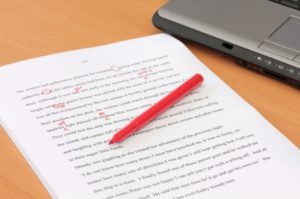We all know the rules for punctuating quotes, right? Commas and periods go inside the quotation marks. Colons and semi-colons go outside.
[This always reminds me of an ancient skit on SNL which I will mangle but had to do with someone telling a story about someone who was sick: He had colon cancer (colon): he had an operation (semi-colon); he died (period)].
So much for a little levity. Somehow or another almost everyone I’ve coached so far has forgotten the rules of punctuating quotes or somehow the use of the same rules when it comes to dialogue causes them to fly out of their heads. So I’m going to give the quick and simple rules on punctuating dialogue (in America–the rules are different in Britain, just to be amusing), and the I’m going to add a special bonus!
1. Each speaker gets a whole new paragraph. So there are never two speakers speaking in the same paragraph, like this:
Incorrect:
“How much time does an ordinary woman spend shopping? What if she hates to shop? Or, the alternative case, she coupons? By what percentage is the time increased if she has, say, one child? By how much is it decreased if she dies young?” “We don’t fit the test case,” Maria, a practical sort, says.
Correct:
“How much time does an ordinary woman spend shopping? What if she hates to shop? Or, the alternative case, she coupons? By what percentage is the time increased if she has, say, one child? By how much is it decreased if she dies young?”
“We don’t fit the test case,” Maria, a practical sort, says.
2. Also note that, as always, the commas and periods go inside the quotation marks. Luckily, in dialogue, you hardly ever have to worry about colons and semi-colons, so the old SNL joke will hardly ever arise.
3. Also, as you can see, the questions mark also goes inside the quotation marks when the line of dialogue is a question, which, in dialogue, is almost always the case again.
4. See, so that is easy.
Here comes the bonus, not a matter of punctuation but of proper usage: Say that she “said,” not the she “exclaimed,” or “shouted,” or “bellowed,” or even “whispered.” If she shouted say that she said it loudly–or let the context show that she was hollering her lungs out.
This isn’t a big thing, unless you are trying to get your work published somewhere reputable, where they will probably think that you aren’t really up on your grammar, if they are benevolent, and, if they have a headache or a huge pile to get through and there are pieces in there where the dialogue is correctly punctuated, they will naturally go to those first and may have to go home and lie down before they ever take a look at yours. And that, in many, many cases, would be a shame because there is a lot of good, original writing going on that just needs a little bit of fixing up. Ain’t no big thing, unless it keeps you from getting read.
P.S. The lines of dialogue above are from my novel, The Algebra of Snow. I used my own work to avoid any copyright problems or the need to make awkward attributions and also to give you a tantalizing taste of this book about a mathematics professor on leave in the Adirondack mountains in winter.
![]() “Tra-la! I went to the book writing villa and learned grammar today!”
“Tra-la! I went to the book writing villa and learned grammar today!”


Great punctuation tips, Ginger. I will share these!